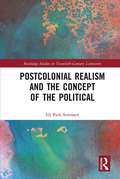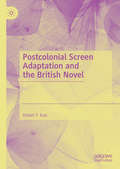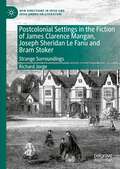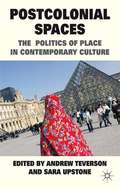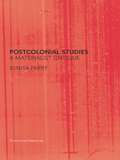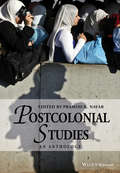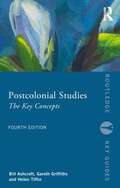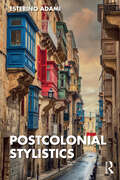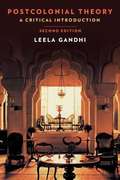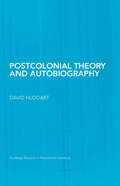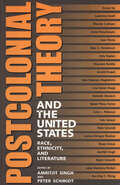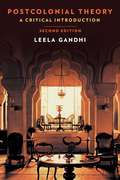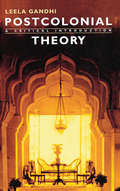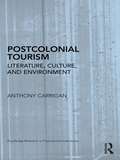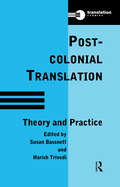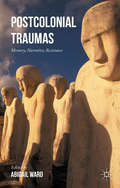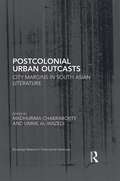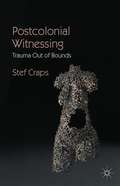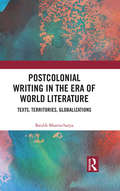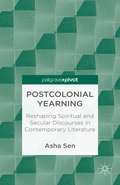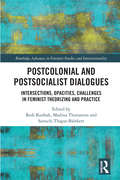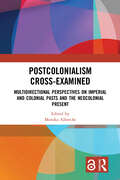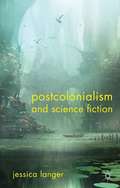- Table View
- List View
Postcolonial Realism and the Concept of the Political (Routledge Studies in Twentieth-Century Literature)
by Eli Park SorensenAs the scholarly world attunes itself once again to the specifically political, this book rethinks the political significance of literary realism within a postcolonial context. Generally, postcolonial studies has either ignored realism or criticized it as being naïve, anachronistic, deceptive, or complicit with colonial discourse; in other words—incongruous with the postcolonial. This book argues that postcolonial realism is intimately connected to the specifically political in the sense that realist form is premised on the idea of a collective reality. Discussing a range of literary and theoretical works, Dr. Sorensen exemplifies that many postcolonial writers were often faced with the realities of an unstable state, a divided community inhabiting a contested social space, the challenges of constructing a notion of ‘the people,’ often out of a myriad of local communities with different traditions and languages brought together arbitrarily through colonization. The book demonstrates that the political context of realism is the sphere or possibility of civil war, divided societies, and unstable communities. Postcolonial realism is prompted by disturbing political circumstances, and it gestures toward a commonly imagined world, precisely because such a notion is under pressure or absent.
Postcolonial Screen Adaptation and the British Novel
by Vivian Y. KaoThis book brings film adaptation of literature to bear on the question of how nineteenth-century imperial ideologies of progress continue to inform power inequalities in a global capitalist age. Not simply the promotion of general betterment for all, improvement in the British colonial context licensed a superior “master race” to “uplift” its colonized populations—morally, socially, and economically. This book argues that, on the one hand, film adaptations of nineteenth-century novels reveal the arrogance and coercive intentions that underpin contemporary notions of development, humanitarianism, and modernity—improvement’s post-Victorian guises. On the other hand, the book also argues that the films use their nineteenth-century source texts to criticize these same legacies of imperialism. By bringing together film adaptation, postcolonial theory, and literary studies, the book demonstrates that adaptation, as both method and cultural product, provides a way to engage with the baggage of ideological heritage in our contemporary global media environment.
Postcolonial Settings in the Fiction of James Clarence Mangan, Joseph Sheridan Le Fanu and Bram Stoker: Strange Surroundings (New Directions in Irish and Irish American Literature)
by Richard JorgeThis book explores how three Anglo-Irish writers, J.C. Mangan, J.S. Le Fanu and Bram Stoker, use settings in their short fictions to recreate, depict and confront Ireland’s colonial situation in the nineteenth century. This study provides an innovative approach by targeting a genre (the short story) which has not been explored in its entirety— certainly not within nineteenth century Ireland - much less using a postcolonial approach to the short story. Added to this is the fact that it analyses how these writers used settings as an anticolonial tool. To do so, the book is divided into two major sections, an analysis of Irish settings and non-Irish ones. It works on the premise that all three writers used the idea of displacement to target colonialism and its effects on Irish society. In short, this book addresses a gap in scholarship, as the Irish Gothic short story as a decolonizing tool has not been sufficiently and globally studied.
Postcolonial Spaces
by Sara Upstone Andrew TeversonPostcolonial Spaces is the first collection of interdisciplinary essays to focus on the crucial role of space in the study of the politics of contemporary postcolonial experience. It brings together influential scholars from the fields of media, film, literature, and geography, embodying the centrality of interdisciplinary thinking to recent postcolonial scholarship. The book includes essays from a wide range of geographies, encompassing Europe, South America, South Asian, Australasia, and the Caribbean. As well as a comprehensive introduction, essays engage with a broad spectrum of postcolonial spatialities, including: Caryl Phillips's Northern landscapes; the role of clothing in Islam and the fiction of Monica Ali; the domestic spaces of South Asian women writers; Peter Carey's representation of territory; South Asian children's literature; map-making in Equador, Michel Foucault's territorial thinking; Jamaica Kincaid's use of the garden-space; migrant spaces in Stephen Frears's Dirty Pretty Things; Bombay in contemporary Indian film; and the spatial politics of theory in the western academy. Featuring a Foreword from Edward Soja, the volume offers a wealth of material for postcolonial students and scholars"
Postcolonial Studies: A Materialist Critique
by Benita ParryThis powerful selection of essays proposes practices of reading and criticism to make the field of postcolonial studies more fully attentive to historical circumstances and socio-material conditions. Benita Parry points to 'directions and dead ends' in the discipline she has helped to shape, with a first series of essays vigorously challenging colonial discourse theory and postcolonialism as we have known them. She then turns to literature with a series of detailed readings that not only demonstrate her theoretical position at work, but also give new dimensions to widely studied texts by Rudyard Kipling, Joseph Conrad, H. G. Wells and E. M. Forster. Parry argues throughout that the material impulses of colonialism, its appropriation of physical resources, exploitation of human labour and institutional repression have too long been allowed to recede from view.
Postcolonial Studies: An Anthology
by Pramod K. NayarThis new anthology brings together the most diverse and recent voices in postcolonial theory to emerge since 9/11, alongside classic texts in established areas of postcolonial studies. Brings fresh insight and renewed political energy to established domains such as nation, history, literature, and gender Engages with contemporary concerns such as globalization, digital cultures, neo-colonialism, and language debates Includes wide geographical coverage – from Ireland and India to Israel and Palestine Provides uniquely broad coverage, offering a full sense of the tradition, including significant essays on science, technology and development, education and literacy, digital cultures, and transnationalism Edited by a distinguished postcolonial scholar, this insightful volume serves scholars and students across multiple disciplines from literary and cultural studies, to anthropology and digital studies
Postcolonial Studies: The Key Concepts (Routledge Key Guides)
by Bill Ashcroft Gareth Griffiths Helen TiffinNow in its fourth edition, this popular A-Z guide provides a comprehensive overview of the issues which characterize postcolonialism: explaining what it is, where it is encountered and the crucial part it plays in debates about race, gender, politics, language and identity.Fully revised and updated, the fourth edition contains more than 30 new entries, including: Anthropocene Biopolitics Decoloniality Ecocriticism Global South Postcolonial sciences Transnationalism. With substantial updates to the further reading, Postcolonial Studies: The Key Concepts remains an essential guide for anyone studying this vibrant field.
Postcolonial Stylistics
by Esterino AdamiThis accessible introduction to postcolonial stylistics looks at the shared aims of stylistics and postcolonial studies and illustrates how to apply the analytical and theoretical tools of stylistics to a selection of literary and non-literary texts from a range of English-speaking postcolonial contexts.Structured around the five keywords of Language, Identity, Belonging, History, and Ecology, the book: sheds light on the way in which writers from a range of former colonial territories have creatively drawn from such thematic areas to construct complex and committed discourses shows how a rigorous linguistic analysis can help reach a better understanding of the rhetorical mechanisms and cultural dynamics operating in these works underlines how meaning is generated from the interaction between author, reader, and context; how narratives shape and propagate a specific worldview; and how metaphor can convey social and political values expands on each keyword by considering texts of different typology such as fiction, poetry, drama, and non-fiction, accompanied by activities and references includes historical and literary postcolonial timelines and an index of names and topics Comprehensive in its coverage and assuming no prior knowledge of the topics considered, the book adopts an interactive and activity-based approach to develop readers’ understanding of linguistic structures and forms through postcolonial texts. Offering a new interdisciplinary perspective, this is essential reading for students new to stylistics and postcolonial literature.
Postcolonial Theory
by Leela GandhiIn the last decade postcolonial¬ism has taken its place with theories such as poststructuralism, psychoanalysis and feminism as a major critical discourse in the humanities. As a consequence of its diverse and interdis-ciplinary usage, this body of thought has generated an enormous corpus of specialised academic writing. Nevertheless, although much has been written under its rubric, ‘postcolonial¬ism’ itself remains a diffuse and nebulous term. Unlike Marxism or deconstruction, for instance, it seems to lack an ‘originary moment’ or a coherent methodology. This book is an attempt to ‘name’ postcolonialism—to delineate the aca¬demic and cultural conditions under which it first emerged and thereby to point to its major preoccupations and areas of concern.
Postcolonial Theory and Autobiography (Routledge Research in Postcolonial Literatures)
by David HuddartCultural theory has often been criticized for covert Eurocentric and universalist tendencies. Its concepts and ideas are implicitly applicable to everyone, ironing over any individuality or cultural difference. Postcolonial theory has challenged these limitations of cultural theory, and Postcolonial Theory and Autobiography addresses the central challenge posed by its autobiographical turn. Despite the fact that autobiography is frequently dismissed for its Western, masculine bias, David Huddart argues for its continued relevance as a central explanatory category in understanding postcolonial theory and its relation to subjectivity. Focusing on the influence of post-structuralist theory on postcolonial theory and vice versa, this study suggests that autobiography constitutes a general philosophical resistance to universal concepts and theories. Offering a fresh perspective on familiar critical figures like Edward W. Said and Gayatri Chakravorty Spivak, by putting them in the context of readings of the work of Jacques Derrida, Gilles Deleuze, and Alain Badiou, this book relates the theory of autobiography to expressions of new universalisms that, together with postcolonial theory, rethink and extend norms of experience, investigation, and knowledge.
Postcolonial Theory and the United States: Race, Ethnicity, and Literature
by Peter Schmidt Amritjit SinghAt the beginning of the twenty-first century, we may be in a “transnational” moment, increasingly aware of the ways in which local and national narratives, in literature and elsewhere, cannot be conceived apart from a radically new sense of shared human histories and global interdependence. To think transnationally about literature, history, and culture requires a study of the evolution of hybrid identities within nation-states and diasporic identities across national boundaries. Studies addressing issues of race, ethnicity, and empire in US culture have provided some of the most innovative and controversial contributions to recent scholarship. Postcolonial Theory and the United States: Race, Ethnicity, and Literature represents a new chapter in the emerging dialogues about the importance of borders on a global scale. This book collects nineteen essays written in the 1990s in this emergent field by both well established and up-and-coming scholars. Almost all the essays have been either especially written for this volume or revised for inclusion here. These essays are accessible, well-focused resources for college and university students and their teachers, displaying both historical depth and theoretical finesse as they attempt close and lively readings. The anthology includes more than one discussion of each literary tradition associated with major racial or ethnic communities. Such a gathering of diverse, complementary, and often competing viewpoints provides a good introduction to the cultural differences and commonalities that comprise the United States today. The volume opens with two essays by the editors: first, a survey of the ideas in the individual pieces, and, second, a long essay that places current debates in US ethnicity and race studies within both the history of American studies as a whole and recent developments in postcolonial theory.
Postcolonial Theory: A Critical Introduction
by Leela GandhiPublished twenty years ago, Leela Gandhi’s Postcolonial Theory was a landmark description of the field of postcolonial studies in theoretical terms that set its intellectual context alongside poststructuralism, postmodernism, Marxism, and feminism. Gandhi examined the contributions of major thinkers such as Edward Said, Gayatri Spivak, Homi Bhabha, and the subaltern historians. The book pointed to postcolonialism’s relationship with earlier anticolonial thinkers such as Frantz Fanon, Albert Memmi, Ngũgĩ wa Thiong’o, and M. K. Gandhi and explained pertinent concepts and schools of thought—hybridity, Orientalism, humanism, Marxist dialectics, diaspora, nationalism, gendered subalternity, globalization, and postcolonial feminism.The revised edition of this classic work reaffirms its status as a useful starting point for readers new to the field and as a provocative account that opens up possibilities for debate. It includes substantial additions: A new preface and epilogue reposition postcolonial studies within evolving intellectual contexts and take stock of important critical developments. Gandhi examines recent alliances with critical race theory and Africanist postcolonialism, considers challenges from postsecular and postcritical perspectives, and takes into account the ontological, environmental, affective, and ethical turns in the changed landscape of critical theory. She describes what is enduring in postcolonial thinking—as a critical perspective within the academy and as an attitude to the world that extends beyond the discipline of postcolonial studies.
Postcolonial Theory: A critical introduction
by Leela GandhiPostcolonial Theory is a ground-breaking critical introduction to the burgeoning field of postcolonial studies.Leela Gandhi is the first to clearly map out this field in terms of its wider philosophical and intellectual context, drawing important connections between postcolonial theory and poststructuralism, postmodernism, marxism and feminism. She assesses the contribution of major theorists such as Edward Said, Gayatri Spivak and Homi Bhabha, and also points to postcolonialism's relationship to earlier thinkers such as Frantz Fanon and Mahatma Gandhi.The book is distinctive in its concern for the specific historical, material and cultural contexts for postcolonial theory, and in its attempt to sketch out the ethical possibilities for postcolonial theory as a model for living with and 'knowing' cultural differences non-violently.Postcolonial Theory is a useful starting point for readers new to the field and a provocative account which opens possibilities for debate.
Postcolonial Tourism: Literature, Culture, and Environment (Routledge Research in Postcolonial Literatures)
by Anthony CarriganThis book is the first literary study of postcolonial tourism. Looking at the cultural and ecological effects of mass tourism development in highly exoticized island states that are still grappling with the legacies of western colonialism, Carrigan contends that postcolonial writers not only dramatize the industry’s most exploitative operations but also provide blueprints toward sustainable tourism futures. By locating this argument in the context of interdisciplinary tourism research, the study shows how imaginative literature can extend some of this field’s key theoretical concepts while making an important contribution to the interface between postcolonial studies and ecocriticism. The book also presents a framework for analyzing how an industry that is subject to constant media attention and involves a huge proportion of the global population shapes the cultural, social, and environmental milieux of postcolonial texts.
Postcolonial Translation: Theory and Practice (Translation Studies)
by Susan Bassnett and Harish TrivediThis outstanding collection brings together eminent contributors (from Britain, the US, Brazil, India and Canada) to examine crucial interconnections between postcolonial theory and translation studies. Examining the relationships between language and power across cultural boundaries, this collection reveals the vital role of translation in redefining the meanings of culture and ethnic identity. The essay topics include:* links between centre and margins in intellectual transfer* shifts in translation practice from colonial to post-colonial societies.* translation and power relations in Indian languages* Brazilian cannibalistic theories in literary transfer.
Postcolonial Traumas: Memory, Narrative, Resistance
by Abigail WardThis collection of essays explores some new possibilities for understanding postcolonial traumas. It examines representations of both personal and collective traumas around the globe from Palestinian, Caribbean, African American, South African, Maltese, Algerian, Indian, Australian and British writers, directors and artists.
Postcolonial Urban Outcasts: City Margins in South Asian Literature (Routledge Research in Postcolonial Literatures)
by Madhurima Chakraborty Umme Al-WazediExtending current scholarship on South Asian Urban and Literary Studies, this volume examines the role of the discontents of the South Asian city. The collection investigates how South Asian literature and literature about South Asia attends to urban margins, regardless of whether the definition of margin is spatial, psychological, gendered, or sociopolitical. That cities are a site of profound paradoxes is nowhere clearer than in South Asia, where urban areas simultaneously represent both the frontiers of globalization as well as the deeply troubling social and political inequalities of the global south. Additionally, because South Asian cities are defined by the palimpsestic confluence of, among other things, colonial oppression, anticolonial nationalism, postcolonial governance, and twenty-first century transnational capital, they are sites where the many faces of empowerment and disempowerment are elaborated. The volume brings together essays that emphasize myriad critical approaches—geospatial, urban-theoretical, diasporic, subaltern, and others. United in their critical empathy for urban outcasts, the chapters respond to central questions such as: What is the relationship between the politico-economic narratives of globally emerging South Asian cities and the dispossessed? How do South Asian cities stand in relationship to the nation and, conversely, how might South Asians in diaspora construct these cities within larger narratives of development, globalization, or as sources of authentic ethnic identities? How is the very skeleton—the space, the territory—of South Asian cities marked with and by exclusionary politics? How do the aesthetic and formal choices undertaken by writers determine the potential for and limit to emancipation of urban outcasts from their oppressive circumstances? Considering fiction, nonfiction, comics, and genre fiction from India, Pakistan, Bangladesh, and Sri Lanka; literature from the twentieth and the twenty-first century; and works that are Anglophone and those that are in translation, this book will be valuable to a range of disciplines.
Postcolonial Urban Outcasts: City Margins in South Asian Literature (Routledge Research in Postcolonial Literatures)
by Madhurima Chakraborty Umme Al-WazediExtending current scholarship on South Asian Urban and Literary Studies, this volume examines the role of the discontents of the South Asian city. The collection investigates how South Asian literature and literature about South Asia attends to urban margins, regardless of whether the definition of margin is spatial, psychological, gendered, or sociopolitical. That cities are a site of profound paradoxes is nowhere clearer than in South Asia, where urban areas simultaneously represent both the frontiers of globalization as well as the deeply troubling social and political inequalities of the global south. Additionally, because South Asian cities are defined by the palimpsestic confluence of, among other things, colonial oppression, anticolonial nationalism, postcolonial governance, and twenty-first century transnational capital, they are sites where the many faces of empowerment and disempowerment are elaborated. The volume brings together essays that emphasize myriad critical approaches—geospatial, urban-theoretical, diasporic, subaltern, and others. United in their critical empathy for urban outcasts, the chapters respond to central questions such as: What is the relationship between the politico-economic narratives of globally emerging South Asian cities and the dispossessed? How do South Asian cities stand in relationship to the nation and, conversely, how might South Asians in diaspora construct these cities within larger narratives of development, globalization, or as sources of authentic ethnic identities? How is the very skeleton—the space, the territory—of South Asian cities marked with and by exclusionary politics? How do the aesthetic and formal choices undertaken by writers determine the potential for and limit to emancipation of urban outcasts from their oppressive circumstances? Considering fiction, nonfiction, comics, and genre fiction from India, Pakistan, Bangladesh, and Sri Lanka; literature from the twentieth and the twenty-first century; and works that are Anglophone and those that are in translation, this book will be valuable to a range of disciplines.
Postcolonial Witnessing
by Stef CrapsDespite a stated commitment to cross-cultural solidarity, trauma theory - an area of cultural investigation that emerged out of the 'ethical turn' affecting the humanities in the 1990s - is marked by a Eurocentric, monocultural bias. Now in paperback and with a Preface by Rosanne Kennedy, this book takes issue with the tendency of the founding texts of the field to marginalize or ignore traumatic experiences of non-Western or minority groups, and to take for granted the universal validity of definitions of trauma and recovery that have developed out of the history of Western modernity. Moreover, it questions the assumption that a modernist aesthetic of fragmentation and aporia is uniquely suited to the task of bearing witness to trauma, and criticizes the neglect of the connections between metropolitan and non-Western or minority traumas. Combining theoretical argument with literary case studies, Postcolonial Witnessing contends that the suffering engendered by colonialism needs to be acknowledged more fully, on its own terms, in its own terms, and in relation to traumatic First World histories if trauma theory is to redeem its promise of cross-cultural ethical engagement.
Postcolonial Writing in the Era of World Literature: Texts, Territories, Globalizations
by Baidik BhattacharyaThis book explores the debates surrounding two dynamic fields – postcolonial studies and world literature. Contrary to many dominant narratives in critical theory, it asserts that as an analytical framework the idea of world literature is dead: the nineteenth-century ideal of world literature had always and already been embedded in colonial histories; and also because whatever promise that ideal held out has been exhausted by postcolonial Anglophone literature. Through fresh and incisive readings of the postcolonial canon and some of its most prominent authors like Rudyard Kipling, V.S. Naipaul, J.M. Coetzee, and Salman Rushdie, the volume discusses how these Anglophone writings have used the banal and ordinary ideal of world literature to fashion out their own trajectories. Ambitious in scope, this book challenges many of the existing theoretical and literary frameworks and offers a radical reimagination of the fields. The volume, written in an accessible and lively prose, will be indispensable for scholars and researchers of literature, critical theory, postcolonial studies, cultural studies, and comparative literature.
Postcolonial Yearning: Reshaping Spiritual and Secular Discourses in Contemporary Literature
by Asha SenAnglophone postcolonial studies has been characterized by its secular nature. Yet as the first generation of scholars grapples with mortality, a yearning for spiritual meaning is emerging in many texts. This study synthesizes the sacred language used in these texts with critical theory in order to create a holistic frame for interpretive analysis.
Postcolonial and Postsocialist Dialogues: Intersections, Opacities, Challenges in Feminist Theorizing and Practice (Routledge Advances in Feminist Studies and Intersectionality)
by Redi KoobakThrough staging dialogues between scholars, activists, and artists from a variety of disciplinary, geographical, and historical specializations, Postcolonial and Postsocialist Dialogues explores the possible resonances and dissonances between the postcolonial and the postsocialist in feminist theorizing and practice. While postcolonial and postsocialist perspectives have been explored in feminist studies, the two analytics tend to be viewed separately. This volume brings together attempts to understand if and how postcolonial and postsocialist dimensions of the human condition - historical, existential, political, and ideological - intersect and correlate in feminist experiences, identities, and struggles. In the three sections that probe the intersections, opacities, and challenges between the two discourses, the authors put under pressure what postcolonialism and postsocialism mean for feminist scholarship and activism. The contributions address the emergence of new political and cultural formations as well as circuits of bodies and capital in a post-Cold War and postcolonial era in currently re-emerging neo-colonial and imperial conflicts. They engage with issues of gender, sexuality, race, migration, diasporas, indigeneity, and disability, while also developing new analytical tools such as postsocialist precarity, queer postsocialist coloniality, uneventful feminism, feminist opacity, feminist queer crip epistemologies. The collection will be of interest for postcolonial and postsocialist researchers, students of gender studies, feminist activists and scholars.
Postcolonialism Cross-Examined: Multidirectional Perspectives on Imperial and Colonial Pasts and the Neocolonial Present
by Monika AlbrechtTaking a strikingly interdisciplinary and global approach, Postcolonialism Cross-Examined reflects on the current status of postcolonial studies and attempts to break through traditional boundaries, creating a truly comparative and genuinely global phenomenon. Drawing together the field of mainstream postcolonial studies with post-Soviet postcolonial studies and studies of the late Ottoman Empire, the contributors in this volume question many of the concepts and assumptions we have become accustomed to in postcolonial studies, creating a fresh new version of the field. The volume calls the merits of the field into question, investigating how postcolonial studies may have perpetuated and normalized colonialism as an issue exclusive to Western colonial and imperial powers. The volume is the first to open a dialogue between three different areas of postcolonial scholarship that previously developed independently from one another: • the wide field of postcolonial studies working on European colonialism, • the growing field of post-Soviet postcolonial/post-imperial studies, • the still fledgling field of post-Ottoman postcolonial/post-imperial studies, supported by sideways glances at the multidirectional conditions of interaction in East Africa and the East and West Indies. Postcolonialism Cross-Examined looks at topics such as humanism, nationalism, multiculturalism, nostalgia, and the Anthropocene in order to piece together a new, broader vision for postcolonial studies in the twenty-first century. By including territories other than those covered by the postcolonial mainstream, the book strives to reframe the “postcolonial” as a genuinely global phenomenon and develop multidirectional postcolonial perspectives.
Postcolonialism Cross-Examined: Multidirectional Perspectives on Imperial and Colonial Pasts and the Neocolonial Present
by Monika AlbrechtTaking a strikingly interdisciplinary and global approach, Postcolonialism Cross-Examined reflects on the current status of postcolonial studies and attempts to break through traditional boundaries, creating a truly comparative and genuinely global phenomenon. Drawing together the field of mainstream postcolonial studies with post-Soviet postcolonial studies and studies of the late Ottoman Empire, the contributors in this volume question many of the concepts and assumptions we have become accustomed to in postcolonial studies, creating a fresh new version of the field. The volume calls the merits of the field into question, investigating how postcolonial studies may have perpetuated and normalized colonialism as an issue exclusive to Western colonial and imperial powers. The volume is the first to open a dialogue between three different areas of postcolonial scholarship that previously developed independently from one another:• the wide field of postcolonial studies working on European colonialism,• the growing field of post-Soviet postcolonial/post-imperial studies,• the still fledgling field of post-Ottoman postcolonial/post-imperial studies, supported by sideways glances at the multidirectional conditions of interaction in East Africa and the East and West Indies.Postcolonialism Cross-Examined looks at topics such as humanism, nationalism, multiculturalism, nostalgia, and the Anthropocene in order to piece together a new, broader vision for postcolonial studies in the twenty-first century. By including territories other than those covered by the postcolonial mainstream, the book strives to reframe the “postcolonial” as a genuinely global phenomenon and develop multidirectional postcolonial perspectives.
Postcolonialism and Science Fiction
by Jessica LangerPostcolonialism and Science Fiction explores intersections and interactions between the genre of science fiction and the theory and practice of postcolonialism, concentrating primarily on contemporary science fiction from the 1950s to the present day. The book argues that several of the foundational myths of science fiction the 'other', or the stranger, and the strange and foreign land are shared at the heart of colonialism, and that postcolonial science fiction has developed unique and creative ways of overcoming and dispelling these myths. Using close readings and thematic studies, ranging from lively discussions of Japanese and Canadian science fiction to a thorough and incisive deconstruction of race and (post)colonialism in the online game World of Warcraft, Postcolonialism and Science Fiction is the first comprehensive study of the complex and developing relationship between the two areas. It will be of interest to fans, researchers, students and anyone else interested in science fiction, postcolonial studies, or both. "
